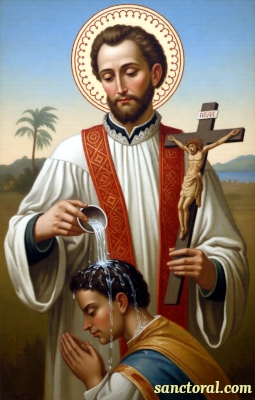Lives of the Saints
Our Models and Protectors
Spiritual Bouquet:
December 3

Saint Francis Xavier
Jesuit Missionary to the Orient
(1506-1552)
A young Spanish gentleman, in the dangerous days of the Reformation, was making a name for himself as a professor of philosophy at the University of Paris. He was aspiring, apparently, to a high dignity, until Saint Ignatius of Loyola decided to undertake the spiritual conquest of this ardent soul. What does it profit a man to gain the entire world, if he suffers the loss of his soul? Ignatius often repeated to the brilliant teacher. The words of Christ, joined to the example of Ignatius and his disciples, prevailed. It was not long before his gifted friend decided to labor for the glory of God, by adopting the evangelical life of an apostle, to which he was indeed called. He was among the first five members of the Society of Jesus, those who with Ignatius made their religious vows in the church of Montmartre in Paris, on the feast of the Assumption in 1534.
On his way to Rome with the others, handicapped by severe penances he had imposed on himself, he remained in Venice and exercised a brief apostolate by caring for the sick in the city hospital. The others waited for him to regain his ability to walk. These first fervent Jesuits were intending to embark for the Holy Land, but were prevented by a war. In Rome, Francis again went to a hospital to serve the sick; he also visited the prisons to encourage and console the poor inmates, while preparing for ordination with the others, according to the desire of the pope.
Saint Ignatius having remained in Venice, the other five returned there afterwards. Francis was sent by Saint Ignatius to the Orient in 1534, where for twelve years he labored unceasingly to win souls, sleeping only three hours a night, eating very little, and bearing the Gospel to Hindustan, to Malacca, and as far as Japan. At all times thwarted by jealousy, covetousness, and the carelessness of those who should have helped and encouraged him, he did not slacken in his apostolic endeavors despite opposition and the difficulties of every sort which he encountered. The gift of tongues and miracles accompanied him everywhere; he resurrected several dead persons. And his inexhaustible kindness was not the least of his assets in winning thousands of pagans to the Faith. He baptized so many that his arm became virtually disabled, ten thousand in a single month in the kingdom of Trevancor, where in the same space of time he saw to the building of forty-five churches. At Meliapour, site of the martyrdom of Saint Thomas, he found the marble on which the Apostle was sacrificed, and which exuded blood the first time Mass was said upon it. Passing through various islands, cities and provinces of India, he strengthened his first conquests by additional preaching. He planted crosses in the public squares and overcame all obstacles.
From India he went to Japan; Saint Francis is called Apostle of Japan as well as of India. There the pagan priests opposed and calumniated him, and tried without success to outwit him in debates. Humiliated, they used subtle means to instill dislike for him in the minds of the court authorities. But he won the love as well as the respect of those he evangelized, blessing them with such miracles as filling the hitherto sterile sea of Cangoxima with inexhaustible reserves of fish. The vast kingdom of China appealed to his charity, and he was resolved to risk his life to force an entry, when God took him to Himself. It was on December 2, 1552, that the Apostle of the Indies died on Sancian, an island facing the city of Canton in China, like Moses, in sight of the land of promise.
Reflection: Some are specially called to work for souls; but there is no one who cannot help greatly to win their salvation. Holy example, earnest intercession, the offerings of our sacrifices and works on their behalf, are within the reach of all. What is needed is the spirit which animated Saint Francis Xavier — the desire to make some return to God for His bounties, with much confidence in His paternal love.
Little Pictorial Lives of the Saints, a compilation based on Butler's Lives of the Saints and other sources, by John Gilmary Shea (Benziger Brothers: New York, 1894); Les Petits Bollandistes: Vies des Saints, by Msgr. Paul Guérin (Bloud et Barral: Paris, 1882), Vol. 14